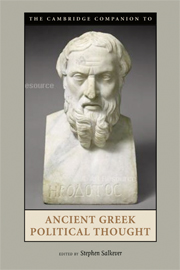Book contents
- Frontmatter
- Introduction
- 1 Homer and Political Thought
- 2 Foundings vs. Constitutions: Ancient Tragedy and the Origins of Political Community
- 3 Most Favored Status in Herodotus and Thucydides: Recasting the Athenian Tyrannicides through Solon and Pericles
- 4 Thucydides and Political Thought
- 5 “This Way of Life, This Contest”: Rethinking Socratic Citizenship
- 6 The Political Drama of Plato’s Republic
- 7 Practical Plato
- 8 Reading Aristotle’s Nicomachean Ethics and Politics as a Single Course of Lectures: Rhetoric, Politics, and Philosophy
- 9 Lived Excellence in Aristotle’s Constitution of Athens: Why the Encomium of Theramenes Matters
- 10 The Virtue Politics of Democratic Athens
- 11 Origins of Rights in Ancient Political Thought
- 12 The Emergence of Natural Law and the Cosmopolis
- Select Bibliography
- Index
10 - The Virtue Politics of Democratic Athens
Published online by Cambridge University Press: 28 September 2009
- Frontmatter
- Introduction
- 1 Homer and Political Thought
- 2 Foundings vs. Constitutions: Ancient Tragedy and the Origins of Political Community
- 3 Most Favored Status in Herodotus and Thucydides: Recasting the Athenian Tyrannicides through Solon and Pericles
- 4 Thucydides and Political Thought
- 5 “This Way of Life, This Contest”: Rethinking Socratic Citizenship
- 6 The Political Drama of Plato’s Republic
- 7 Practical Plato
- 8 Reading Aristotle’s Nicomachean Ethics and Politics as a Single Course of Lectures: Rhetoric, Politics, and Philosophy
- 9 Lived Excellence in Aristotle’s Constitution of Athens: Why the Encomium of Theramenes Matters
- 10 The Virtue Politics of Democratic Athens
- 11 Origins of Rights in Ancient Political Thought
- 12 The Emergence of Natural Law and the Cosmopolis
- Select Bibliography
- Index
Summary
In the past three decades, contemporary Aristotelians have posed effective challenges to liberal theory by stressing the importance of citizenship, political virtue, civic prudence, and the political passions. Without denying the manifest goods made possible by the liberal political order, neo-Aristotelian theorists have argued that we can improve our understanding of political life by directing attention to the resource-rich tradition of Aristotelian political science. Dissatisfied with the apathy of liberal citizens, for example, Susan Collins has revived a specifically Aristotelian model of citizenship that is the product of authoritative civic education focused on seeking the human good. Gerald Mara argues that the Rawlsian and Habermasian vision of “public reason” and the autonomy of political agents can be helpfully supplemented by the Aristotelian exploration of the passions that shape public rhetoric and communication. Ronald Beiner has redeployed the Aristotelian concepts of eudaimonia, phronēsis, and virtue in order to criticize the subjectivism of liberal “values” and the emptiness of liberal neutrality. Beiner's view is that active, Aristotelian citizenship focused on working out a shared human destiny is the best way to realize, in practice, our higher and distinctively human capacities for judgment. Stephen Salkever theorizes an Aristotelian “ethics of natural questions” as a deliberative model superior to that offered by the typically Kantian exponents of deliberative democracy, such as Habermas.
- Type
- Chapter
- Information
- The Cambridge Companion to Ancient Greek Political Thought , pp. 271 - 300Publisher: Cambridge University PressPrint publication year: 2009
- 8
- Cited by

